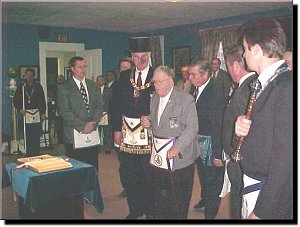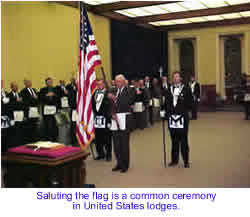For more information, see:
Related Topics:

A common question appearing in online venues is "What goes on at Masonic meetings?"
Perhaps because someone has read various things about Masonic ceremonies, they're confused as to how it all works. The questions are understandable, particularly in light of the ravings of anti-Masons on the web. We hope this page will help explain it to you just what happens.
Essentially all local lodges do things pretty much the same way despite differences in ritual occasioned by their belonging to different Grand Lodges. Basically two things occur: business and (perhaps 'or') ritual degree work during which a candidate is received into membership.
The business of the lodge is often quite mundane: voting to pay a utility bill, for example (although in some lodges that tedium is relieved by an expedited process wherein the Wardens - essentially the First and Second Vice President - pre-approve things and a single vote is cast relying on their good judgment rather than addressing each item in turn).
Other business might include anything which any local club or group would encounter. There are votes to admit new members, there are suggestions from the officers and/or the members about activities to hold and things to do and there are reports on events that have occurred. In addition, there is a Treasurer's Report and the reading of the minutes of the preceding meeting by the Secretary along with any correspondence which he might have. The Secretary and Master will report on any word they've received regarding the sickness or distress of a member or his family. Other officers and members might add information as well.
 Sometimes there may be a
lengthy discussion on a matter of importance - or on a Committee's report on
their deliberations pertaining to it. A question like repairing or replacing the
roof, for example, would normally be referred to a committee that would consider
all the options and make a recommendation. Sometimes too, there may be an
award presentation for long-term service to the Fraternity, for example.
Sometimes there may be a
lengthy discussion on a matter of importance - or on a Committee's report on
their deliberations pertaining to it. A question like repairing or replacing the
roof, for example, would normally be referred to a committee that would consider
all the options and make a recommendation. Sometimes too, there may be an
award presentation for long-term service to the Fraternity, for example.
But this is, for all intents and purposes, what goes on at a Masonic meeting. No worshipping Satan, no dancing around naked in the moonlight, and nothing that anyone would find offensive in any way.
 Meetings are begun with
ceremony: members don their Masonic regalia and a standard protocol (including
memorized material) is recited. A prayer (sometimes a standard one as approved
by the Grand Lodge and sometimes extemporaneous) is said by the officer designated to
serve as Chaplain. In some parts of the world, Masonic recognition of the
liberties enjoyed are acknowledged through a flag ceremony. The Holy Bible, carpenter's Square, and Compass are present
to remind members of the many moral lessons they symbolically impart.
Meetings conclude in similar fashion: recitation of memorized ritual and a
prayer.
Meetings are begun with
ceremony: members don their Masonic regalia and a standard protocol (including
memorized material) is recited. A prayer (sometimes a standard one as approved
by the Grand Lodge and sometimes extemporaneous) is said by the officer designated to
serve as Chaplain. In some parts of the world, Masonic recognition of the
liberties enjoyed are acknowledged through a flag ceremony. The Holy Bible, carpenter's Square, and Compass are present
to remind members of the many moral lessons they symbolically impart.
Meetings conclude in similar fashion: recitation of memorized ritual and a
prayer.
In addition to the above, there are times when a meeting might consist partially or entirely of the performance of a degree during which a candidate receives further advancement in Freemasonry. The Entered Apprentice (1st), Fellowcraft (2nd) and Master Mason (3rd) Degrees may be conferred on the same night as a business meeting or - depending on the will of the lodge - on a separate evening/day.
There may be a meal - full or simply snacks - served either before or after the meeting. In UK lodges, for example, the 'festive board' is a very regular part of the meeting. In the US, there may be a 'collation' following the meeting which could be as simple as coffee and cookies. In Scottish Lodges, there may be alcoholic refreshments afterwards. All of these activities follow the norms of their particular country and location. While it might seem very out of place to a US Mason to have a 'couple of pints' after a lodge meeting, in Scotland it's a very accepted practice - after nearly EVERY kind of meeting with Masonic ones being no different than any other.
![]()
Is that all there is?
Actually, no! In many lodges, there's a time set aside for a program - generally after the meeting. It may consist of a wide variety of things, from a physician explaining the Heimlich Maneuver to a presentation by a member on his trip to some distant country. It may be a round-table discussion on Masonic history or perhaps a local scholarship recipient reading his/her essay on their country's past. Masonic programs can be, essentially, whatever interests the lodge. Most members find them intriguing even if prior to that time it was something they'd have never found interesting. It's an opportunity to learn and to broaden one's horizon: it's an advancement in education!
Beyond these things, there's the friendship and fellowship which is SO very much a part of Freemasonry. During the meeting, there is no 'free discussion' amongst members: the meeting is 'controlled' by the Master just as a President of any other organization would do - not allowing undirected chatter to disrupt the proceedings. Before and afterwards, however, members and officers mingle freely and talk about essentially everything. Catching up on local events, finding out how things are going with other members and more, it's a process wherein Masons come to know each other better and the Brotherhood bond forms more tightly. Masons will sometimes joke that they'd take the before and after while skipping the middle! This, though, is said tongue in cheek because each recognizes the importance of being together in the formalized setting of the lodge meeting.
Are the meetings boring then?
From the perspective of this website's author, it involves two things: expectation and preparation.
If a member enters the meeting expecting to be totally bored and feeling that his time would be spent better elsewhere, then yes, it will be a very boring meeting indeed. A member arriving with a positive attitude, looking forward to an evening of friendship and fellowship amongst like-minded persons who - although from widely differing backgrounds and stations in life - all want to be there will likely find the time spent to be of good value.
Preparation, however, is
essential for a productive, anticipated, and enjoyed meeting. The Master as the
presiding officer must take particular care to ensure preparations are made for
all facets of the evening. Planning for any well-run meeting must be done in
advance and include having an agenda for what will occur. At the time of the
meeting, the Master will ensure that proper attention is paid to the welcoming
of guests and visitors, the comfort of the membership before, during and after
the meeting, and the friendship and hospitality that mark a well-run and
interesting meeting. While the ritual will be the same, it's an essential part
of Freemasonry and for Masons, should never grow tiring!
![]()
We hope this description has helped clarify any concerns or confusion you might have had.














